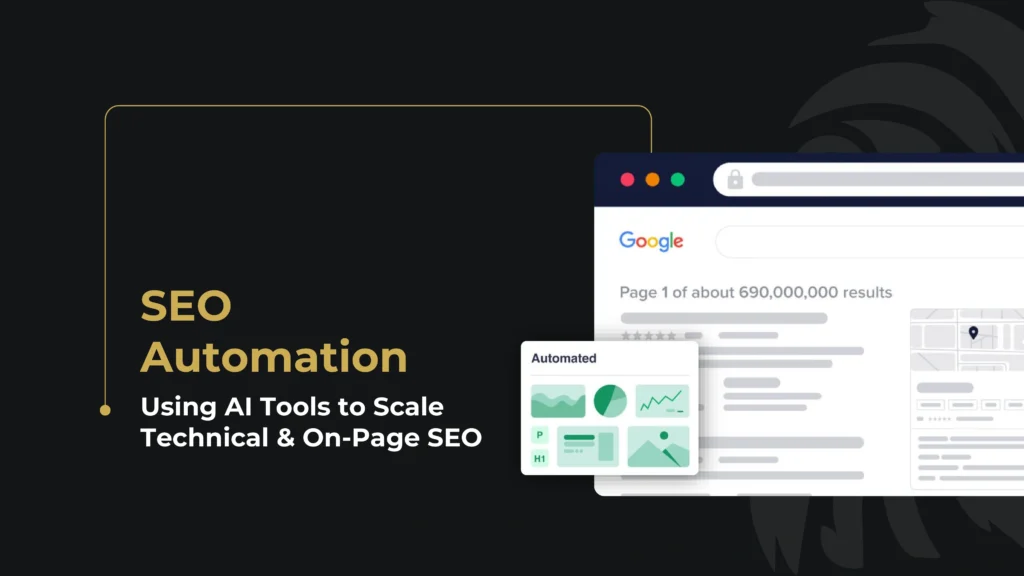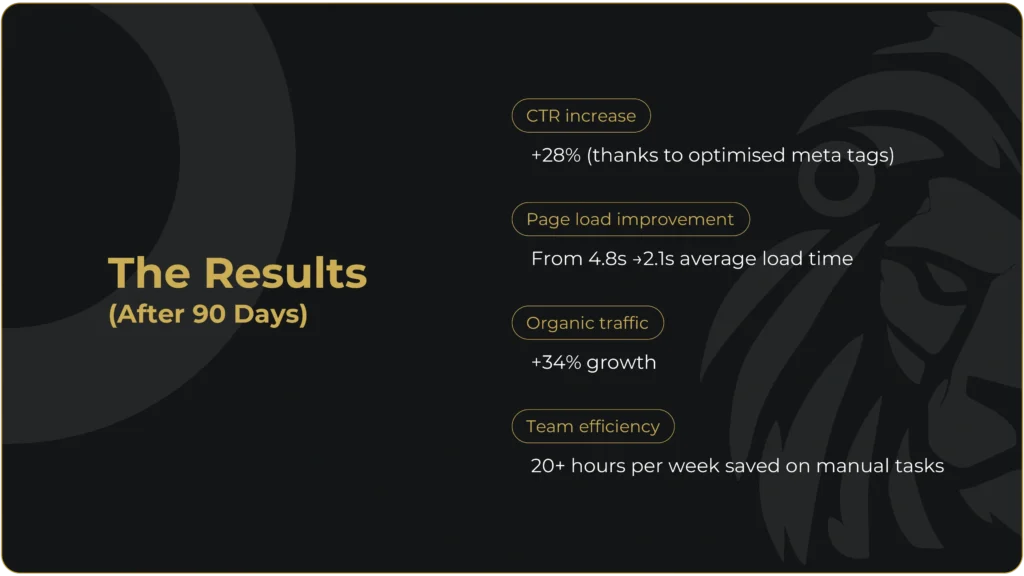SEO is no longer just about keywords and backlinks; it’s about speed, precision, and scale.
In 2025, brands that rely solely on manual SEO risk falling behind, as competitors embrace AI-powered tools to automate everything from technical audits to on-page optimisation. But here’s the catch: automation can’t replace strategy. Done wrong, it produces generic, low-value content; done right, it multiplies efficiency and results.
The question isn’t, “Should you use AI for SEO?” But, “How do you use it without losing control?” Let’s explore how smart automation transforms technical and on-page SEO.
What is SEO Automation (and Why It Matters in 2025)
SEO automation is the process of using AI tools, scripts, and platforms to handle repetitive or time-intensive SEO tasks at scale. Instead of manually auditing every page or writing hundreds of meta descriptions, automation streamlines workflows and delivers faster, more accurate outputs.
For example, tools can run automated crawls to identify broken links or technical errors, generate keyword clusters to group search intent, build content briefs in minutes, and even recommend internal linking suggestions across thousands of pages.
In 2025, automation matters more than ever because SEO is becoming increasingly complex, from Google’s AI Overviews to Core Web Vitals updates. By delegating mechanical tasks to automation, teams can redirect their focus toward strategic decision-making, content quality, and user experience.
The real power of SEO automation lies not in replacing human expertise but in freeing it to work where it matters most.
The Best SEO Automation Tools
Citation management platforms that push consistent NAP data across directories.
| Tool | Best For | Automation Use Case | Link |
| ChatGPT | Content & On-Page | Generate briefs, FAQs, meta descriptions | ChatGPT |
| SurferSEO | Content Optimisation | Content scoring, keyword suggestions | SurferSEO |
| RankMath AI | On-Page SEO | Automated meta tags & schema in WordPress | RankMath |
| Screaming Frog | Technical SEO | Automated site crawls & error detection | Screaming Frog |
| PageSpeed Insights API | Technical SEO | Automates Core Web Vitals reports & performance tracking | PageSpeed Insights |
| Zapier | Reporting | Automates dashboards & SEO alerts | Zapier |
| Ahrefs | Off-Page SEO | Backlink monitoring & competitor tracking | Ahrefs |
Technical SEO Tasks You Can Automate
Technical SEO is often repetitive, but automation makes it faster and more reliable. Instead of manually checking every page, you can rely on tools and scripts to handle the heavy lifting. Key areas you can automate include:
- Automated Site Crawls: Tools like Screaming Frog or JetOctopus quickly detect broken links, duplicate content, and indexation issues.
- Log File Analysis: Python scripts or cloud-based crawlers reveal wasted crawl budget and blocked resources.
- Schema Markup: AI-driven generators (RankMath AI, Merkle) apply structured data consistently across pages.
- Core Web Vitals Monitoring: Automated reports and alerts track page speed, INP, and layout shifts.
- Error Tracking: Automated systems flag 404s, 500 errors, and downtime before they impact SEO.
By automating these tasks, your site remains healthy while your team can focus on strategy and growth.
On-Page SEO Automation With AI
On-page SEO is where automation can save huge amounts of time without sacrificing quality. Instead of manually writing or optimising every page element, AI-powered tools streamline the process and ensure consistency across your site.
- Meta Titles & Descriptions: AI tools like RankMath AI or ChatGPT can generate scalable metadata in seconds. With human editing, you get the best of both worlds: speed and accuracy.
- Content Optimization: Platforms such as SurferSEO and Clearscope analyse SERPs and provide content scores, helping you expand content with the right terms and structure.
- IInternal Linking: AI-powered tools suggest contextual links across hundreds of pages, which boosts crawlability and enhances user navigation.
- Entity SEO: AI can recommend semantic keywords, FAQs, and related entities, enriching topical depth and improving visibility in Google’s AI Overviews.
With smart automation, on-page SEO becomes faster, more intelligent, and better aligned with strategic goals.
Reporting & Analytics Automation
One of the biggest time-savers in SEO is automating reporting and analytics. IInstead of manually pulling data from multiple platforms, automation ensures that you always have accurate and up-to-date insights.
- PageSpeed Insights API: Automates Core Web Vitals tracking and generates performance reports across all pages.
- Zapier: Connects tools like Google Search Console, GA4, and Ahrefs to create automated alerts and custom dashboards.
- Looker Studio (Data Studio): Builds live dashboards that update automatically, eliminating the need for manual weekly reports.
With reporting automation in place, SEO teams spend less time collecting data and more time acting on it, focusing on growth opportunities instead of spreadsheets.
The Tools Driving SEO Automation
The rise of AI has provided SEO professionals with access to powerful tools that save time and enhance accuracy. Each tool serves a specific role, from technical audits to content optimisation, making automation practical and scalable.
- ChatGPT & Gemini: Ideal for generating content briefs, blog outlines, and FAQs tailored to search intent.
- SurferSEO / Frase: Provide on-page optimisation by analysing top SERPs, suggesting semantic keywords, and scoring content quality.
- RankMath AI & Yoast AI: Automate meta titles, descriptions, and schema markup directly within WordPress.
- Screaming Frog + Python: Automate crawls, extract SEO data at scale, and run customised technical reports.
- Zapier / Make.com: Connect SEO data from tools like GA4, GSC, and Ahrefs into automated dashboards and alerts.
When combined strategically, these tools streamline workflows, reduce repetitive tasks, and help SEO teams focus on growth rather than grunt work.
Where to Be Careful (Limits of SEO Automation)
While SEO automation is powerful, it isn’t a silver bullet. Relying too heavily on AI can introduce risks that harm rankings instead of improving them. To maximise the benefits of automation, businesses must recognise its limitations.
- Risk of Generic Content: AI-generated text can lack originality or depth, which may trigger Google’s E-E-A-T (Experience, Expertise, Authoritativeness, Trustworthiness) filters and reduce visibility.
- Over-Reliance on AI: Automated schema or content suggestions can sometimes be inaccurate, leading to poor user experiences or technical errors.
- Human Oversight Required: AI can accelerate workflows, but expert SEO review is essential. Titles, descriptions, and content should always be edited and fact-checked before publishing.
Automation functions optimally as a catalyst, expediting the execution process, yet it should never supplant strategic thinking, quality control, or human creativity.
Case Study: How SEO Automation Boosted an E-Commerce Brand’s Growth
Client: Mid-sized UK e-commerce store (fashion niche)
Challenge: The client struggled with over 800 product pages that lacked optimised meta tags, slow page load times, and weak internal linking. Their SEO team was spending hours on manual updates instead of focusing on strategy.
The Automation Approach
- Meta Data Automation: Implemented RankMath AI to generate meta titles and descriptions, then refined with human editing.
- Core Web Vitals Monitoring: Used PageSpeed Insights API to track performance and trigger alerts when page speed dropped.
- Internal Linking: AI tool suggested contextual links across hundreds of product pages, improving crawlability.
The Results (After 90 Days)
- CTR increase: +28% (thanks to optimised meta tags)
- Page load improvement: From 4.8s → 2.1s average load time
- Organic traffic: +34% growth
- Team efficiency: 20+ hours per week saved on manual tasks
Key Takeaway
By combining automation and expert oversight, the client achieved faster execution, stronger rankings, and measurable ROI.
Conclusion: Smarter SEO with Automation
SEO in 2025 is no longer about working harder; it’s about working smarter. Automation allows businesses to streamline technical checks, optimise content on a large scale, and generate insights instantly. From AI-driven meta tags to Core Web Vitals monitoring, the right tools eliminate repetitive tasks so you can focus on strategy, creativity, and growth.
But automation alone isn’t enough. Without expert oversight, AI can create generic content, misapplied schema, or missed opportunities. That’s why the most effective approach is blending automation with human expertise.
At Dominate Online, we combine cutting-edge SEO automation with proven strategies to deliver results that last. Explore our SEO services that also focus on AI visibility and see how we can help your business stay ahead in the AI-driven search landscape.



